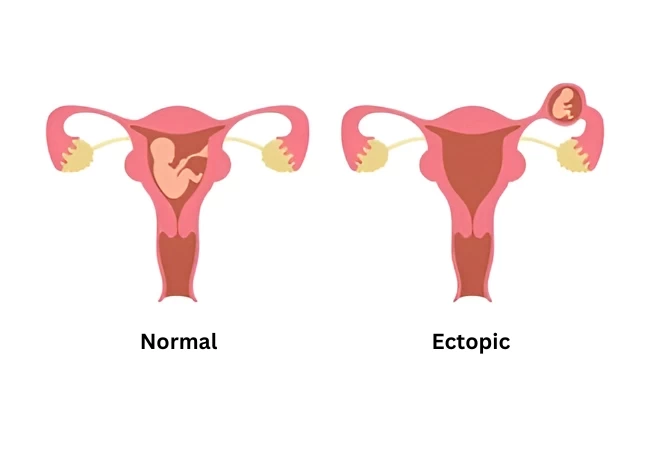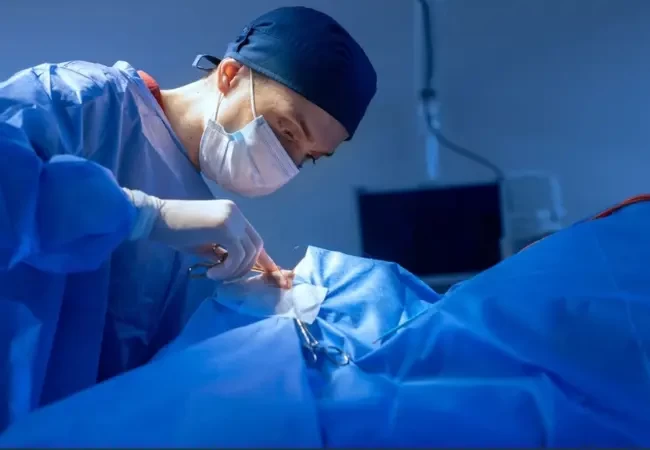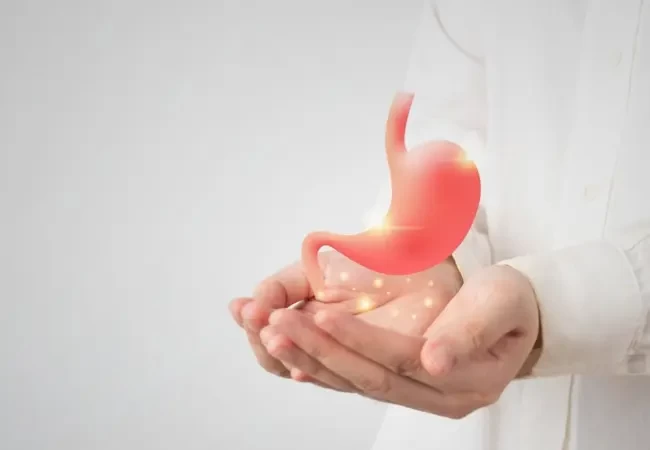 Medically reviewed by: Dr. Marina Varghese, Consultant in Obstetrics & Gynaecology - Written by Jasni Salim - Updated on 13/06/2024
Medically reviewed by: Dr. Marina Varghese, Consultant in Obstetrics & Gynaecology - Written by Jasni Salim - Updated on 13/06/2024Pregnancy involves many steps in a woman's body, starting from when the egg is fertilized until the baby is born. One of these steps is when the fertilized egg attaches itself to the uterus. However, in an ectopic pregnancy, the fertilized egg attaches somewhere outside the uterus like the fallopian tube, cervix, or abdominal cavity.
A pregnancy test will show that a woman is pregnant even in the case of ectopic pregnancy, but a fertilized egg will not develop properly outside the uterus. Ectopic pregnancies happen in about 1 out of every 50 pregnancies according to the American Academy of Family Physicians (AAFP).
An untreated ectopic pregnancy can be a serious medical emergency. Continue reading to know how ectopic pregnancy is detected, its causes, symptoms, diagnosis, and treatment.
The ectopic pregnancy causes are not always known. However, there are certain conditions that are related to ectopic pregnancies in some cases which are as follows:
Your doctor can actually find your exact ectopic pregnancy causes when you consult them.
Any woman who is sexually active has some risk of an ectopic pregnancy. This risk goes up due to any of the following reasons:
If you find any of the risk factors given above, it is important to discuss them with your doctor. They can help you reduce the risk of future ectopic pregnancies by working with you or referring you to a fertility specialist.
Common symptoms in both ectopic and uterus pregnancies are breast soreness and nausea. But, certain symptoms are more typical in ectopic pregnancies which are given below and might signal a medical emergency.
If you are pregnant and experience any of the symptoms like ectopic pregnancy bleeding or any other given above, you should contact your doctor immediately.
If you think you might have an ectopic pregnancy, see your doctor right away. Ectopic pregnancies cannot be diagnosed with just a physical exam, but your doctor might still do one to check for other issues.
To diagnose an ectopic pregnancy, your doctor might do a transvaginal ultrasound. This means that they will insert a special instrument into your vagina to see if there is a gestational sac in your uterus.
Your doctor might also do a blood test to check your levels of hCG and progesterone which are hormones present during pregnancy. If these levels decrease or stay the same over a few days and no gestational sac is seen in the ultrasound, you likely have an ectopic pregnancy.
Also, if you have severe symptoms like intense pain or heavy ectopic pregnancy bleeding, there might not be enough time for all these tests. In extreme cases, the fallopian tube can rupture and cause serious internal bleeding. Your doctor will then perform emergency surgery to treat it immediately.
Ectopic pregnancies are not at all safe for the mother and the embryo cannot develop normally outside the uterus. Thus, the embryo will need to be removed quickly to protect the mother's health and future fertility. Ectopic pregnancy treatment options depend on where the ectopic pregnancy has occurred and how advanced it is. Some of the treatments carried out by doctors are given below.
If your doctor thinks immediate problems are unlikely, they might prescribe medications to prevent the ectopic mass from bursting. One common medication for this condition is methotrexate (Rheumatrex), which stops the growth of rapidly dividing cells, like those in the ectopic mass. You will get this medication as an injection and will need regular blood tests to check its effectiveness. Methotrexate can cause symptoms similar to a miscarriage such as cramping, bleeding, and passing tissue. Surgery is rarely needed after this. Methotrexate does not include the same risks of fallopian tube damage as surgery, but you might not be able to get pregnant for several months afterward.
Many surgeons recommend removing the embryo and fixing any internal damage. This procedure is known as a laparotomy. Your doctor will use a small camera to see inside through a small cut. The surgeon then removes the embryo and fixes any damage to the fallopian tube.
If the first surgery does not work, the surgeon might do another laparotomy, this time with a larger cut. Your doctor might also need to remove the fallopian tube if it is damaged.
After your surgery, your doctor will give you instructions on how to care for your incisions at home. The main goal is to keep them clean and dry as they heal. You should check them every day for signs of infection like:
After surgery, you might have light vaginal bleeding and small blood clots for up to six weeks. Other things that you can do at home itself include:
Always tell your doctor if your pain gets worse or if you feel something is not right.
Ectopic pregnancies are a serious condition that will need immediate medical attention. No matter if it is through medication or surgery, ectopic pregnancies should be detected on time. Above you have seen how ectopic pregnancy is detected and all the rest of the things. You should consult your doctor immediately if you find any of the above symptoms of ectopic pregnancy.
Ernakulam Medical Centre, the best hospital in Kochi is popular for its expertise in handling ectopic pregnancies. With a team of skilled and experienced gynaecologist in Kochi and cutting-edge medical equipment, EMC is committed to delivering exceptional care. Our goal is to ensure your health and wellbeing which will enable you to lead a healthy and active life after surgery. If you are looking for a trusted medical center for any surgical procedure, Ernakulam Medical Centre is your ideal choice.


Discover the truth behind common plastic surgery myths. Learn what's real, what's outdated, and how modern procedures truly work.

A step-by-step overview of GI surgery, covering what to do before surgery, what happens in the OR, and how to ensure a strong recovery.

Learn about cancer, its early signs, and prevention tips to lower your risk. Early detection saves lives—stay informed, take proactive steps, and protect your health.

Discover why a skilled pediatrician is essential for your child's growth, development, and overall well-being, from infancy through adolescence.

Discover how dermatology can help tackle acne, slow aging, and treat various skin conditions for healthier, more radiant skin.

Discover common childhood allergies, their symptoms, and management tips. Stay informed to keep your child safe and healthy.

Your liver plays a vital role in metabolism, digestion, immunity, and detoxification. Learn how liver health affects your body and ways to maintain its function.

Strong bones support your body and protect your health. Discover simple diet, exercise, and lifestyle tips to maintain bone strength at any age.

Discover the symptoms, causes, and treatment of hypertensive heart disease. Learn how high blood pressure affects your heart and when to seek medical care.

Learn about chest pain symptoms, causes, and treatments. Know when to seek medical help for a healthier heart.